中考英语复习--冠词课件(共25张PPT)
文档属性
| 名称 | 中考英语复习--冠词课件(共25张PPT) |
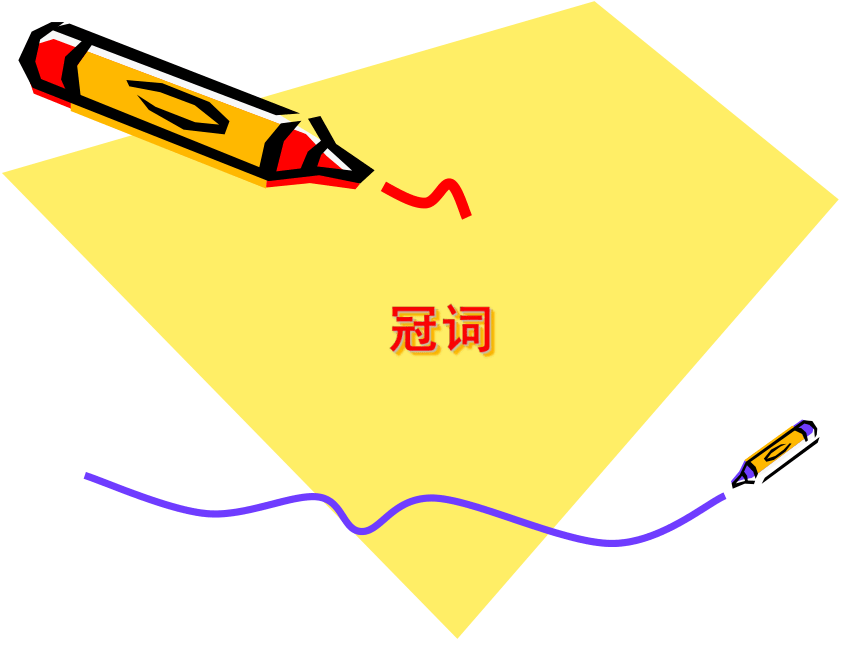
|
|
| 格式 | pptx | ||
| 文件大小 | 96.5KB | ||
| 资源类型 | 教案 | ||
| 版本资源 | 通用版 | ||
| 科目 | 英语 | ||
| 更新时间 | 2024-10-28 00:00:00 | ||
图片预览

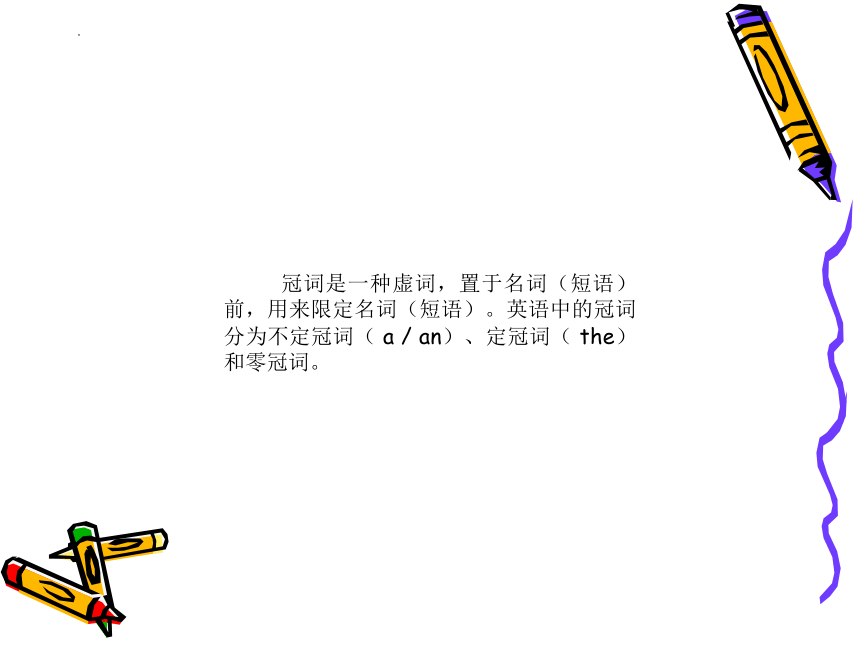
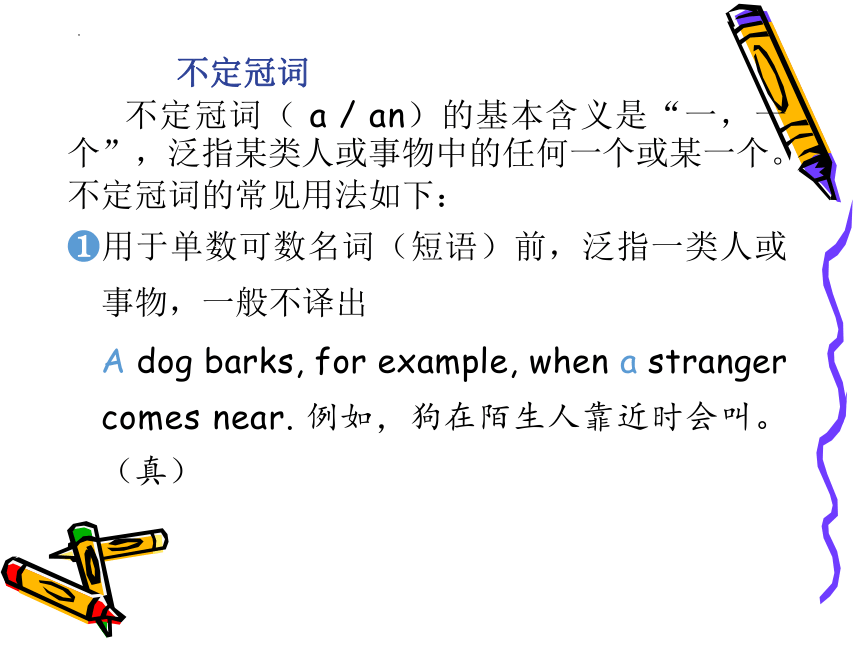
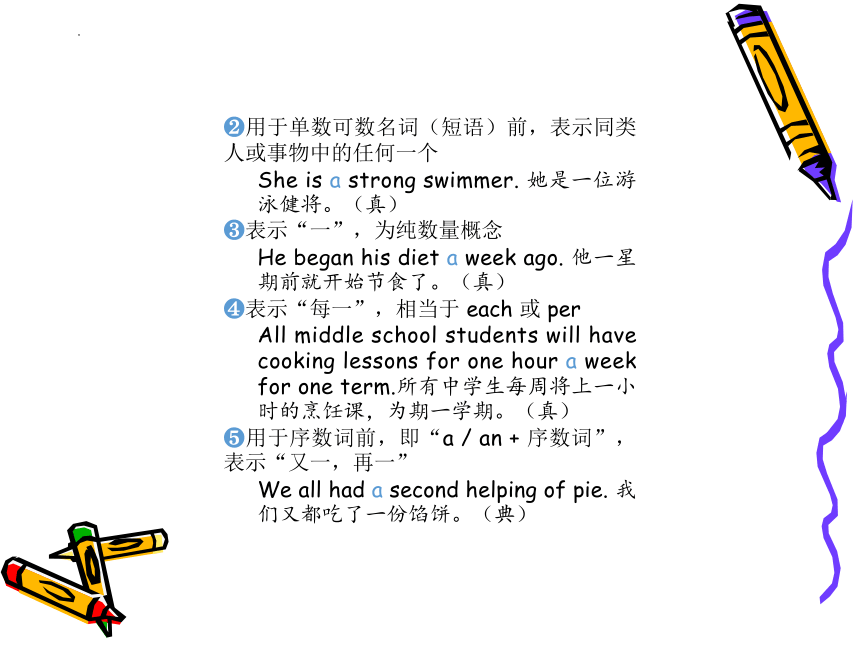
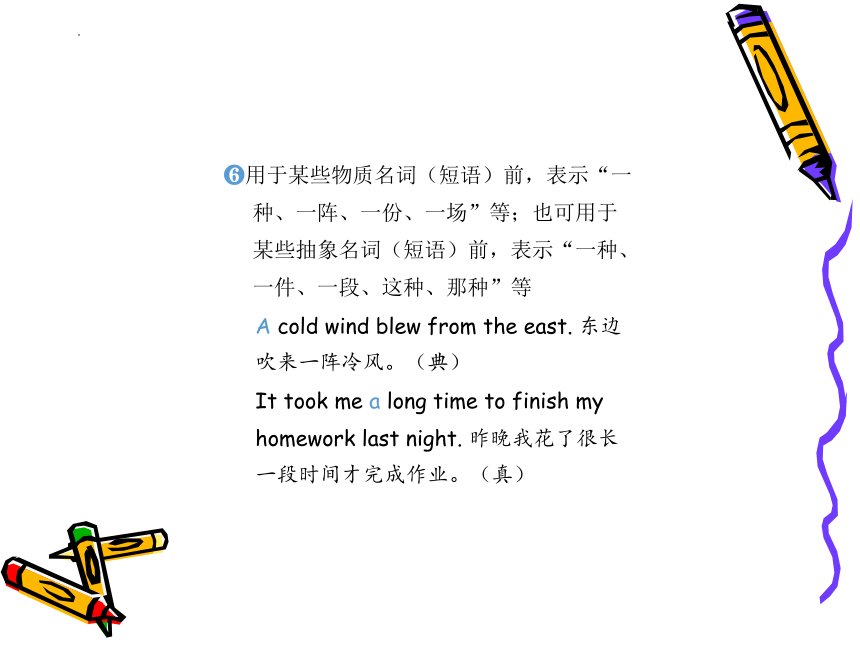
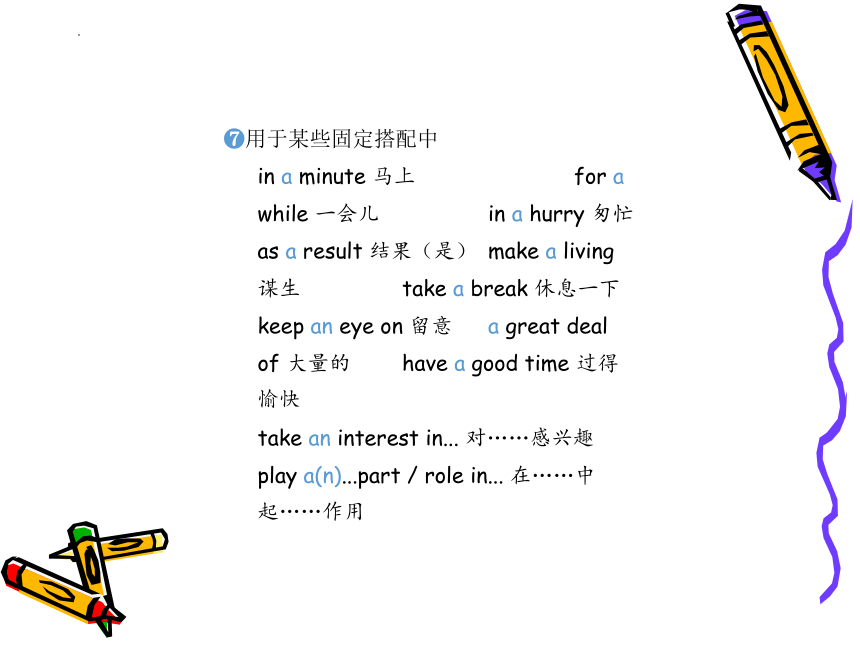
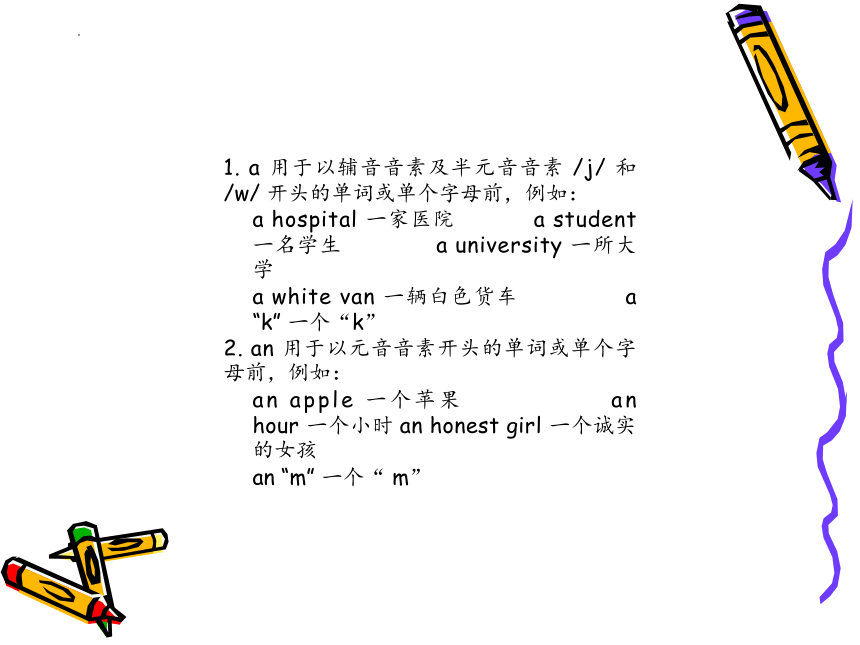
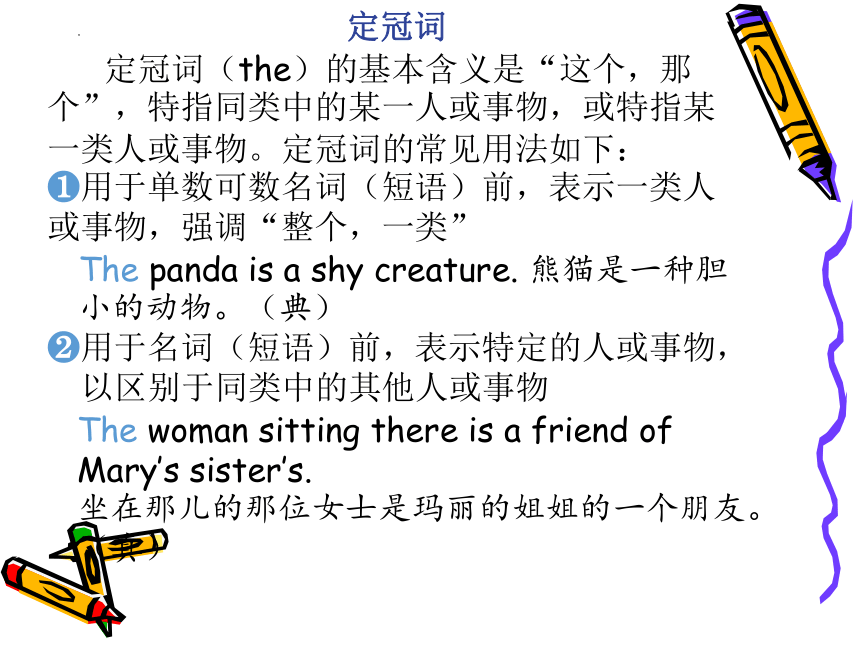
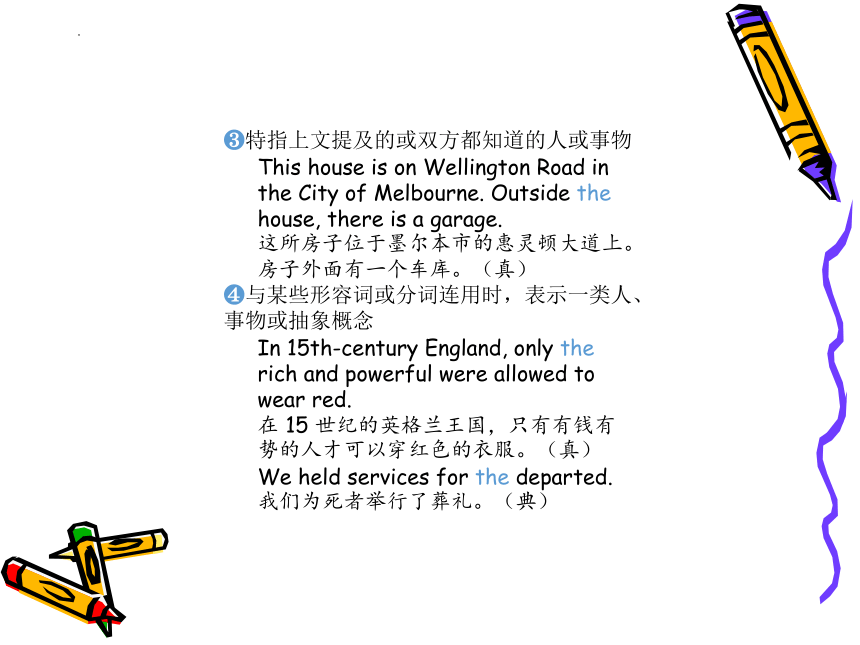
文档简介
(共25张PPT)
冠词
冠词是一种虚词,置于名词(短语)前,用来限定名词(短语)。英语中的冠词分为不定冠词( a / an)、定冠词( the)和零冠词。
不定冠词
不定冠词( a / an)的基本含义是“一,一个”,泛指某类人或事物中的任何一个或某一个。不定冠词的常见用法如下:
用于单数可数名词(短语)前,泛指一类人或事物,一般不译出
A dog barks, for example, when a stranger comes near. 例如,狗在陌生人靠近时会叫。(真)
用于单数可数名词(短语)前,表示同类人或事物中的任何一个
She is a strong swimmer. 她是一位游泳健将。(真)
表示“一”,为纯数量概念
He began his diet a week ago. 他一星期前就开始节食了。(真)
表示“每一”,相当于 each 或 per
All middle school students will have cooking lessons for one hour a week for one term.所有中学生每周将上一小时的烹饪课,为期一学期。(真)
用于序数词前,即“a / an + 序数词”,表示“又一,再一”
We all had a second helping of pie. 我们又都吃了一份馅饼。(典)
用于某些物质名词(短语)前,表示“一种、一阵、一份、一场”等;也可用于某些抽象名词(短语)前,表示“一种、一件、一段、这种、那种”等
A cold wind blew from the east. 东边吹来一阵冷风。(典)
It took me a long time to finish my homework last night. 昨晚我花了很长一段时间才完成作业。(真)
用于某些固定搭配中
in a minute 马上 for a while 一会儿 in a hurry 匆忙
as a result 结果(是) make a living 谋生 take a break 休息一下
keep an eye on 留意 a great deal of 大量的 have a good time 过得愉快
take an interest in... 对……感兴趣 play a(n)...part / role in... 在……中起……作用
1. a 用于以辅音音素及半元音音素 /j/ 和 /w/ 开头的单词或单个字母前,例如:
a hospital 一家医院 a student 一名学生 a university 一所大学
a white van 一辆白色货车 a “k” 一个“k”
2. an 用于以元音音素开头的单词或单个字母前,例如:
an apple 一个苹果 an hour 一个小时 an honest girl 一个诚实的女孩
an “m” 一个“ m”
定冠词
定冠词(the)的基本含义是“这个,那个”,特指同类中的某一人或事物,或特指某一类人或事物。定冠词的常见用法如下:
用于单数可数名词(短语)前,表示一类人或事物,强调“整个,一类”
The panda is a shy creature. 熊猫是一种胆小的动物。(典)
用于名词(短语)前,表示特定的人或事物,以区别于同类中的其他人或事物
The woman sitting there is a friend of Mary’s sister’s.
坐在那儿的那位女士是玛丽的姐姐的一个朋友。(真)
特指上文提及的或双方都知道的人或事物
This house is on Wellington Road in the City of Melbourne. Outside the house, there is a garage.
这所房子位于墨尔本市的惠灵顿大道上。房子外面有一个车库。(真)
与某些形容词或分词连用时,表示一类人、事物或抽象概念
In 15th-century England, only the rich and powerful were allowed to wear red.
在 15 世纪的英格兰王国,只有有钱有势的人才可以穿红色的衣服。(真)
We held services for the departed. 我们为死者举行了葬礼。(典)
用于姓氏的复数形式前,表示“……夫妇”或“……一家人”
Let’s invite the Smiths to our house for a drink. 我们邀请史密斯一家到我们家喝点东西吧。(真)
用于世界上独一无二的事物前
Can you imagine living on the moon 你能想象在月球上生活吗?(教)
用于序数词或形容词最高级前
The second carpenter’s mouse, however, looked quite rough.
然而,第二个木匠做的老鼠看起来很粗糙。(真)
Air pollution is the most serious. 空气污染是最严重的。(真)
用于表示时期、朝代、年代等的名词(短语)或复数形式的数词前
The Great Wall which we can see now was rebuilt during the Ming Dynasty.
我们现在看到的长城是在明朝重修的。(教)
The development of colour printing processes in the 1930s also helped to increase sales of birthday cards. 20世纪30年代,彩色印刷工艺的发展也对提高生日贺卡的销量有所帮助。(真)
表示演奏某种西洋乐器时,常用于西洋乐器名称前
She could play the piano when she was five. 她五岁时就会弹钢琴了。(真)
用于介词短语中表示方向或方位的名词(短语)前,或用于大写的方位名词(短语)前(指某个国家或世界的一部分)
Our hotel is located in the south of Beijing. 我们的酒店位于北京的南边。(真)
They were both raised in the South. 他们俩都是在南方长大的。(典)
用于表示政府、议会、团体、机关或组织机构的专有名词前
He was working under the flag of the United Nations. 他在联合国工作。(典)
用于表示各种比赛或赛事的专有名词前
Wang Yang is a volunteer of the Olympic Games. 王洋是一名奥运会志愿者。(教)
用于童话或寓言标题中的动物名称前
The Farmer and the Snake is a classic fable.
《农夫与蛇》是一个经典的寓言故事。(典)
用于表示单位的名词前,结构常为“by / to + the +单位名词”
Tea is sold by the pound. 茶叶按磅出售。(典)
They rowed 40 to the minute. 他们每分钟划 40 桨。(典)
用于某些固定搭配中
all the time 一直 at the same time 同时 by the way 顺便提一下
in the past 在过去 on the contrary 恰恰相反 on the other hand 另一方面
零冠词
零冠词即不用或省略冠词。零冠词的常见用法如下:
常用于国名和大洲名前
The kangaroo is a native of Australia. 袋鼠是产于澳大利亚的动物。(典)
The organization provided medicine for millions of children in Asia and Africa.
该组织为亚洲和非洲的数百万儿童提供了药物。(真)
可用于人名、带职位或头衔的专有名词前
Jenny told him she wanted to go home. 珍妮告诉他,她想回家。(真)
President Biden is due to visit the country next month.
拜登总统定于下月访问该国。(典)
用于表示泛指的复数可数名词(短语)或不可数名词(短语)前
In China, guests are expected to bring a gift to hosts.
在中国,客人要给主人带礼物。(真)
News travels fast these days. 如今消息传播得很快。(典)
用于被物主限定词、不定限定词、指示限定词、名词所有格等修饰的名词(短语)前
Those materials are very bad for our health.
那些材料对我们的健康危害很大。(真)
There seems to be no solution to the problem. 这个问题似乎没有解决办法。(真)
Shakespeare’s writing is still popular today.
莎士比亚的作品如今仍然很受欢迎。(典)
可用于节日名称前
Children’s Day is coming! 儿童节快到了!(真)
带有 festival 的节日名称前要用定冠词 the。例如:
These are traditional foods for the Spring Festival. 这些是春节的传统食物。(真)
可用于表示星期、月份、季节等时间的名词前
My father would always take me to the swimming pool in summer.
我爸爸总会在夏天带我去游泳池。(真)
可用于球类、棋、牌等运动或游戏名称前,且与 play 构成固定搭配
I can play basketball. 我会打篮球。(教)
He was playing chess with his uncle. 他当时正和他的姑父下国际象棋。(典)
可用于表示三餐的名词前
We cook and have lunch with them almost every Saturday.
我们几乎每周六都和他们一起做午饭,并一起吃。(教)
表示三餐的名词前有形容词修饰时,其前通常加不定冠词;若特指某一次早、中、晚餐时,其前须用定冠词。例如:
Would you like to join me for a quick lunch 你愿意中午和我一起吃顿快餐吗?(真)
Who’s getting the lunch 谁在做午餐?(典)
可用于表示语言或学科的名词前
English is hard to learn. 英语很难学。(真)
She studied chemistry for three years. 她学了三年化学。(典)
and 连接的两个或两个以上的名词(短语)指同一个人或事物时,通常除第一个名词(短语)外,其余名词(短语)前均用零冠词
Turner is a writer and critic. 特纳是一位作家兼评论家。(典)
and 连接的两个或两个以上的名词(短语)指不同的人或事物时,通常每个名词(短语)前都要加不定冠词。例如:
They had a butler, a cook, and a maid.
他们有一位男管家、一位厨师和一位女仆。(典)
可用于作表语、同位语等说明身份、职业等的单数可数名词(短语)或表示某种抽象概念的名词(短语)前
She is head of the production company. 她是这家制片公司的负责人。(典)
用于表示颜色的名词(短语)前
Red is the colour of fire. 红色是火的颜色。(真)
用于以人名作为书名、剧名或电影名的词(组)前
Our new production of Hamlet is currently in rehearsal.
我们的新版《哈姆雷特》目前正在排练之中。(典)
用于表示方向或方位且作状语的词前
Japan lies east of China. 日本位于中国东面。(典)
用于某些固定搭配中
in fact 事实上 on foot 步行 by bus 乘公共汽车
at present 现在 take care of 照顾;负责 by plane 乘飞机
at home 在家里 day and night 夜以继日 in public 公开地
在某些固定搭配中,名词前有无冠词意义往往不同。例如:
in front of... 在……前面(物体外部) go to school 去上学
in the front of... 在……前面(物体内部) go to the school 去学校(办事)
in hospital (生病)住院 in place of... 代替……
in the hospital 在医院 in the place of... 在……的位置上
in charge of... 负责…… in class 在上课
in the charge of... 由……负责 in the class 在这个班级里
冠词
冠词是一种虚词,置于名词(短语)前,用来限定名词(短语)。英语中的冠词分为不定冠词( a / an)、定冠词( the)和零冠词。
不定冠词
不定冠词( a / an)的基本含义是“一,一个”,泛指某类人或事物中的任何一个或某一个。不定冠词的常见用法如下:
用于单数可数名词(短语)前,泛指一类人或事物,一般不译出
A dog barks, for example, when a stranger comes near. 例如,狗在陌生人靠近时会叫。(真)
用于单数可数名词(短语)前,表示同类人或事物中的任何一个
She is a strong swimmer. 她是一位游泳健将。(真)
表示“一”,为纯数量概念
He began his diet a week ago. 他一星期前就开始节食了。(真)
表示“每一”,相当于 each 或 per
All middle school students will have cooking lessons for one hour a week for one term.所有中学生每周将上一小时的烹饪课,为期一学期。(真)
用于序数词前,即“a / an + 序数词”,表示“又一,再一”
We all had a second helping of pie. 我们又都吃了一份馅饼。(典)
用于某些物质名词(短语)前,表示“一种、一阵、一份、一场”等;也可用于某些抽象名词(短语)前,表示“一种、一件、一段、这种、那种”等
A cold wind blew from the east. 东边吹来一阵冷风。(典)
It took me a long time to finish my homework last night. 昨晚我花了很长一段时间才完成作业。(真)
用于某些固定搭配中
in a minute 马上 for a while 一会儿 in a hurry 匆忙
as a result 结果(是) make a living 谋生 take a break 休息一下
keep an eye on 留意 a great deal of 大量的 have a good time 过得愉快
take an interest in... 对……感兴趣 play a(n)...part / role in... 在……中起……作用
1. a 用于以辅音音素及半元音音素 /j/ 和 /w/ 开头的单词或单个字母前,例如:
a hospital 一家医院 a student 一名学生 a university 一所大学
a white van 一辆白色货车 a “k” 一个“k”
2. an 用于以元音音素开头的单词或单个字母前,例如:
an apple 一个苹果 an hour 一个小时 an honest girl 一个诚实的女孩
an “m” 一个“ m”
定冠词
定冠词(the)的基本含义是“这个,那个”,特指同类中的某一人或事物,或特指某一类人或事物。定冠词的常见用法如下:
用于单数可数名词(短语)前,表示一类人或事物,强调“整个,一类”
The panda is a shy creature. 熊猫是一种胆小的动物。(典)
用于名词(短语)前,表示特定的人或事物,以区别于同类中的其他人或事物
The woman sitting there is a friend of Mary’s sister’s.
坐在那儿的那位女士是玛丽的姐姐的一个朋友。(真)
特指上文提及的或双方都知道的人或事物
This house is on Wellington Road in the City of Melbourne. Outside the house, there is a garage.
这所房子位于墨尔本市的惠灵顿大道上。房子外面有一个车库。(真)
与某些形容词或分词连用时,表示一类人、事物或抽象概念
In 15th-century England, only the rich and powerful were allowed to wear red.
在 15 世纪的英格兰王国,只有有钱有势的人才可以穿红色的衣服。(真)
We held services for the departed. 我们为死者举行了葬礼。(典)
用于姓氏的复数形式前,表示“……夫妇”或“……一家人”
Let’s invite the Smiths to our house for a drink. 我们邀请史密斯一家到我们家喝点东西吧。(真)
用于世界上独一无二的事物前
Can you imagine living on the moon 你能想象在月球上生活吗?(教)
用于序数词或形容词最高级前
The second carpenter’s mouse, however, looked quite rough.
然而,第二个木匠做的老鼠看起来很粗糙。(真)
Air pollution is the most serious. 空气污染是最严重的。(真)
用于表示时期、朝代、年代等的名词(短语)或复数形式的数词前
The Great Wall which we can see now was rebuilt during the Ming Dynasty.
我们现在看到的长城是在明朝重修的。(教)
The development of colour printing processes in the 1930s also helped to increase sales of birthday cards. 20世纪30年代,彩色印刷工艺的发展也对提高生日贺卡的销量有所帮助。(真)
表示演奏某种西洋乐器时,常用于西洋乐器名称前
She could play the piano when she was five. 她五岁时就会弹钢琴了。(真)
用于介词短语中表示方向或方位的名词(短语)前,或用于大写的方位名词(短语)前(指某个国家或世界的一部分)
Our hotel is located in the south of Beijing. 我们的酒店位于北京的南边。(真)
They were both raised in the South. 他们俩都是在南方长大的。(典)
用于表示政府、议会、团体、机关或组织机构的专有名词前
He was working under the flag of the United Nations. 他在联合国工作。(典)
用于表示各种比赛或赛事的专有名词前
Wang Yang is a volunteer of the Olympic Games. 王洋是一名奥运会志愿者。(教)
用于童话或寓言标题中的动物名称前
The Farmer and the Snake is a classic fable.
《农夫与蛇》是一个经典的寓言故事。(典)
用于表示单位的名词前,结构常为“by / to + the +单位名词”
Tea is sold by the pound. 茶叶按磅出售。(典)
They rowed 40 to the minute. 他们每分钟划 40 桨。(典)
用于某些固定搭配中
all the time 一直 at the same time 同时 by the way 顺便提一下
in the past 在过去 on the contrary 恰恰相反 on the other hand 另一方面
零冠词
零冠词即不用或省略冠词。零冠词的常见用法如下:
常用于国名和大洲名前
The kangaroo is a native of Australia. 袋鼠是产于澳大利亚的动物。(典)
The organization provided medicine for millions of children in Asia and Africa.
该组织为亚洲和非洲的数百万儿童提供了药物。(真)
可用于人名、带职位或头衔的专有名词前
Jenny told him she wanted to go home. 珍妮告诉他,她想回家。(真)
President Biden is due to visit the country next month.
拜登总统定于下月访问该国。(典)
用于表示泛指的复数可数名词(短语)或不可数名词(短语)前
In China, guests are expected to bring a gift to hosts.
在中国,客人要给主人带礼物。(真)
News travels fast these days. 如今消息传播得很快。(典)
用于被物主限定词、不定限定词、指示限定词、名词所有格等修饰的名词(短语)前
Those materials are very bad for our health.
那些材料对我们的健康危害很大。(真)
There seems to be no solution to the problem. 这个问题似乎没有解决办法。(真)
Shakespeare’s writing is still popular today.
莎士比亚的作品如今仍然很受欢迎。(典)
可用于节日名称前
Children’s Day is coming! 儿童节快到了!(真)
带有 festival 的节日名称前要用定冠词 the。例如:
These are traditional foods for the Spring Festival. 这些是春节的传统食物。(真)
可用于表示星期、月份、季节等时间的名词前
My father would always take me to the swimming pool in summer.
我爸爸总会在夏天带我去游泳池。(真)
可用于球类、棋、牌等运动或游戏名称前,且与 play 构成固定搭配
I can play basketball. 我会打篮球。(教)
He was playing chess with his uncle. 他当时正和他的姑父下国际象棋。(典)
可用于表示三餐的名词前
We cook and have lunch with them almost every Saturday.
我们几乎每周六都和他们一起做午饭,并一起吃。(教)
表示三餐的名词前有形容词修饰时,其前通常加不定冠词;若特指某一次早、中、晚餐时,其前须用定冠词。例如:
Would you like to join me for a quick lunch 你愿意中午和我一起吃顿快餐吗?(真)
Who’s getting the lunch 谁在做午餐?(典)
可用于表示语言或学科的名词前
English is hard to learn. 英语很难学。(真)
She studied chemistry for three years. 她学了三年化学。(典)
and 连接的两个或两个以上的名词(短语)指同一个人或事物时,通常除第一个名词(短语)外,其余名词(短语)前均用零冠词
Turner is a writer and critic. 特纳是一位作家兼评论家。(典)
and 连接的两个或两个以上的名词(短语)指不同的人或事物时,通常每个名词(短语)前都要加不定冠词。例如:
They had a butler, a cook, and a maid.
他们有一位男管家、一位厨师和一位女仆。(典)
可用于作表语、同位语等说明身份、职业等的单数可数名词(短语)或表示某种抽象概念的名词(短语)前
She is head of the production company. 她是这家制片公司的负责人。(典)
用于表示颜色的名词(短语)前
Red is the colour of fire. 红色是火的颜色。(真)
用于以人名作为书名、剧名或电影名的词(组)前
Our new production of Hamlet is currently in rehearsal.
我们的新版《哈姆雷特》目前正在排练之中。(典)
用于表示方向或方位且作状语的词前
Japan lies east of China. 日本位于中国东面。(典)
用于某些固定搭配中
in fact 事实上 on foot 步行 by bus 乘公共汽车
at present 现在 take care of 照顾;负责 by plane 乘飞机
at home 在家里 day and night 夜以继日 in public 公开地
在某些固定搭配中,名词前有无冠词意义往往不同。例如:
in front of... 在……前面(物体外部) go to school 去上学
in the front of... 在……前面(物体内部) go to the school 去学校(办事)
in hospital (生病)住院 in place of... 代替……
in the hospital 在医院 in the place of... 在……的位置上
in charge of... 负责…… in class 在上课
in the charge of... 由……负责 in the class 在这个班级里
同课章节目录
- 词法
- 名词
- 动词和动词短语
- 动词语态
- 动词时态
- 助动词和情态动词
- 非谓语动词
- 冠词
- 代词
- 数词和量词
- 形容词副词及其比较等级
- 介词和介词短语
- 连词和感叹词
- 构词法
- 相似、相近词比较
- 句法
- 陈述句
- 一般疑问句和否定疑问句
- 特殊疑问句及选择疑问句
- 反意疑问句
- 存在句(There be句型)
- 宾语从句
- 定语从句
- 状语从句
- 主谓一致问题
- 简单句
- 并列句
- 复合句
- 主谓一致
- 主、表语从句
- 名词性从句
- 直接引语和间接引语
- 虚拟语气
- 感叹句
- 强调句
- 倒装句
- 祈使句
- 句子的成分
- 句子的分类
- 题型专区
- 单项选择部分
- 易错题
- 完形填空
- 阅读理解
- 词汇练习
- 听说训练
- 句型转换
- 补全对话
- 短文改错
- 翻译
- 书面表达
- 任务型阅读
- 语法填空
- 其他资料
